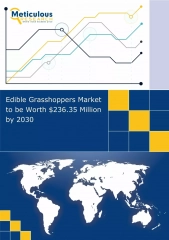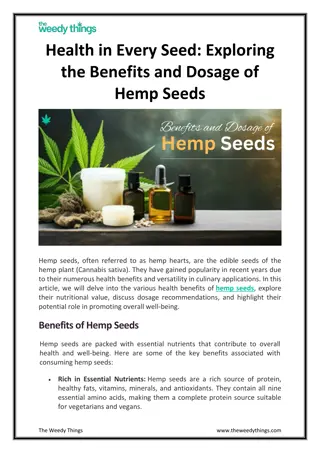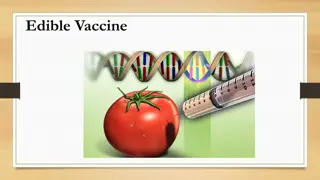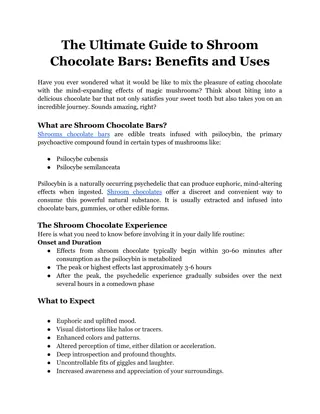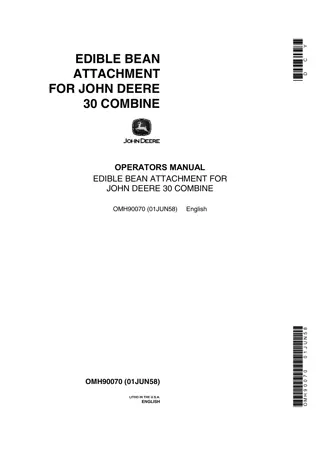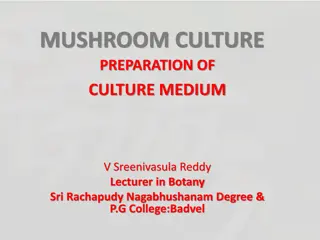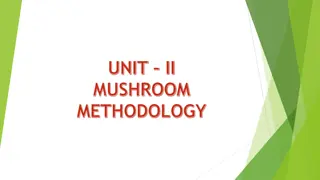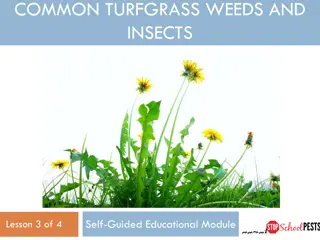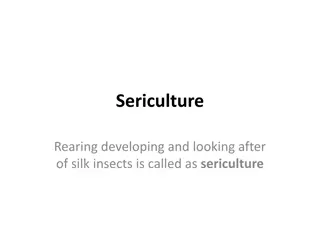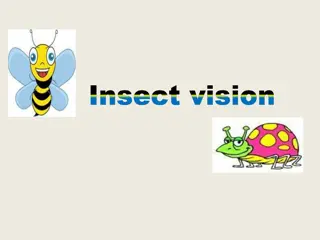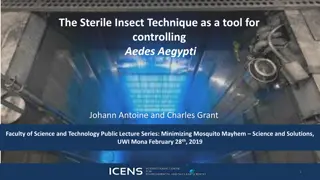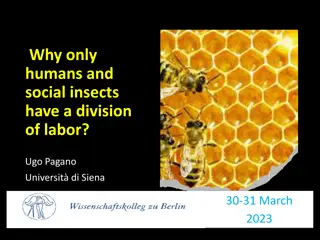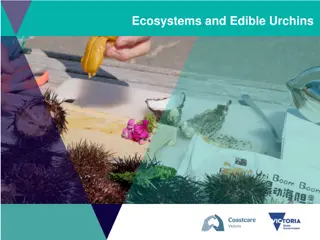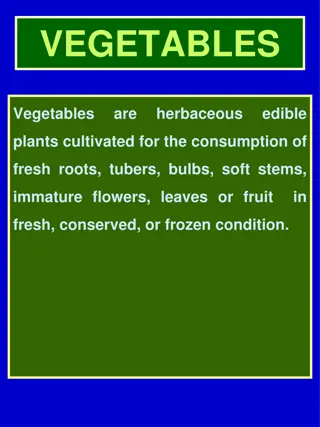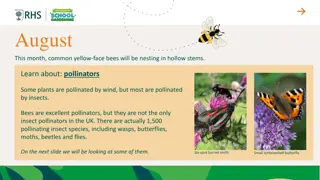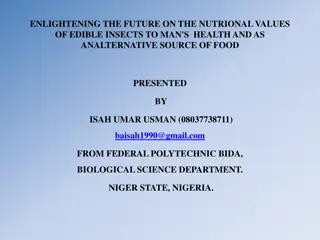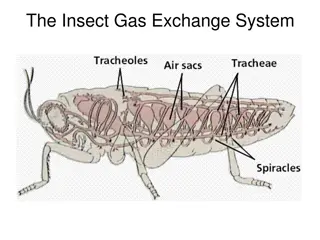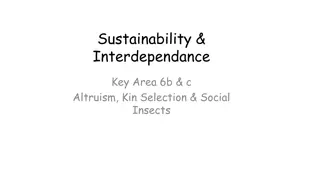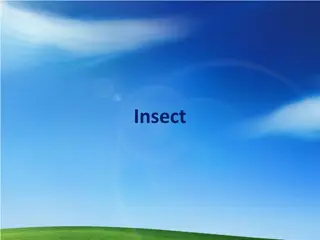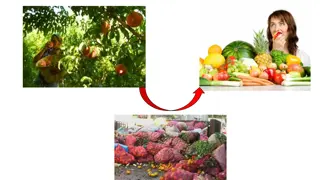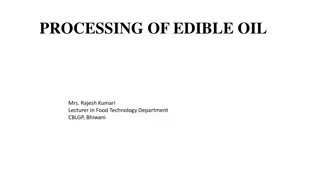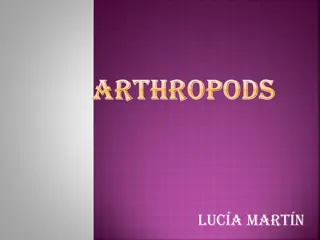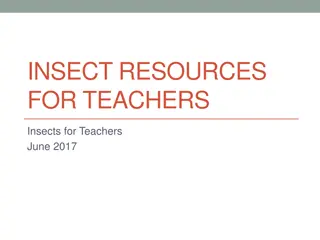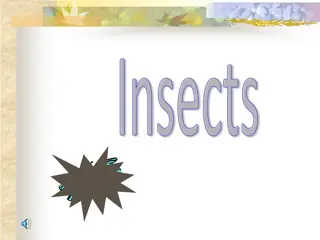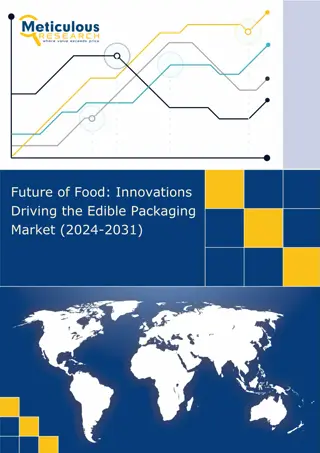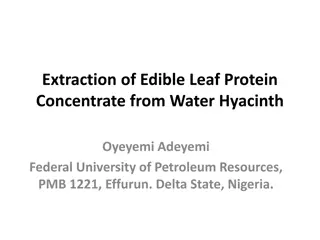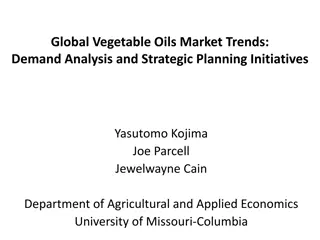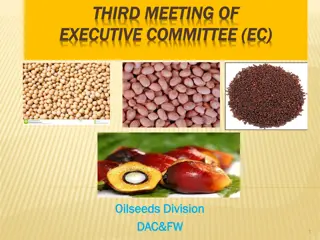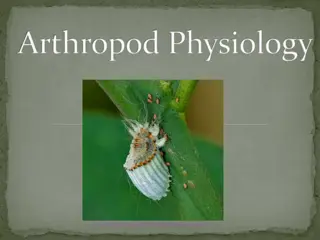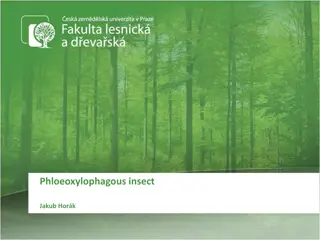Insect Abdominal Structures and Appendages: An Overview
The abdomen of insects plays crucial roles in respiration, reproduction, digestion, excretion, and metabolism. The number of abdominal segments varies across species, with reductions and modifications seen in different insect groups. From the propodeum to pregential and postgenital segments, each pa
1 views • 6 slides
Collagen Casings Market_Blog
\nCollagen Casings Market by Type (Edible, Non-Edible), Caliber (Small, Large), Application (Fresh Sausages, Processed Sausages (Pre-cooked, Smoked, Cured), End User (Food Service Providers, Food Retail), Distribution Channel
0 views • 2 slides
Edible Grasshoppers Market to be Worth $236.35 Million by 2030
The edible grasshoppers market is segmented based on product type, end use, distribution channel, and geography. The study also evaluates industry competitors and analyses the market at the regional and country levels.
1 views • 3 slides
Exploring the Benefits and Dosage of Hemp Seeds
Hemp seeds, often referred to as hemp hearts, are the edible seeds of the hemp plant (Cannabis sativa). They have gained popularity in recent years due to their numerous health benefits and versatility in culinary applications. In this article, we will delve into the various health benefits of hemp
13 views • 4 slides
Edible Grasshoppers Market to be Worth $236.35 Million by 2030
Edible grasshoppers appear more climate-friendly than cattle, pigs or chickens since they require less space and water to grow and develop and cause fewer greenhouse gas emissions. The environmental impact of food production is increasingly brought to the forefront of sustainability debates, particu
3 views • 3 slides
Exploring Edible Vaccines: Advantages, Limitations, and Significance
Edible vaccines, a novel approach in vaccine technology, offer numerous advantages such as easy administration, cost-effectiveness, and enhanced immunity. However, they also present challenges like dosage consistency, stability issues, and potential side effects. The significance of edible vaccines
0 views • 9 slides
The Ultimate Guide to Shroom Chocolate Bars_ Benefits and Uses
Psilocybin is a naturally occurring psychedelic that can produce euphoric, mind-altering\neffects when ingested. Shroom chocolates offer a discreet and convenient way to\nconsume this powerful natural substance. It is usually extracted and infused into\nchocolate bars, gummies, or other edible forms
4 views • 4 slides
John Deere Edible Bean Attachment for 30 Combine Operator’s Manual Instant Download (Publication No.OMH90070)
Please open the website below to get the complete manual\n\n\/\/
0 views • 8 slides
Mushroom Culture: Preparation of Culture Medium and Edible Mushroom Examples
Mushroom culture involves the preparation of culture medium for cultivating various edible mushrooms. This process includes the systematic classification, structure, and examples of edible mushrooms. The medium preparation methods and materials are essential for successful mushroom cultivation. The
0 views • 24 slides
Understanding Mushroom Types and Characteristics
Mushrooms, consumed as energy-rich food, come in various types like poisonous and common edible mushrooms. Poisonous mushrooms contain toxins that can be harmful, while edible mushrooms offer a variety of nutritious options. Learn about the features and symptoms associated with poisonous mushrooms a
2 views • 19 slides
Turfgrass Management Education: Weeds, Insects, and IPM
Explore the essential aspects of managing common turfgrass weeds and insects, along with adopting Integrated Pest Management (IPM) practices for maintaining healthy outdoor areas. Learn about plant species suited for specific environments, strategies to manage pests, and the components of an effecti
0 views • 41 slides
The Fascinating World of Sericulture: Rearing and Harvesting Silk Insects
Sericulture, the art of rearing and nurturing silk insects, has been practiced since ancient times, yielding the exquisite natural fiber known as silk. This fine material has captivated humans for its beauty and versatility. The process involves skill and scientific knowledge, with various types of
0 views • 16 slides
Understanding Light Perception in Insects
Insects perceive light through various receptors such as compound eyes, ocelli, and stemmata. Compound eyes, made up of ommatidia, play a key role in capturing light stimuli ranging from UV to red wavelengths. Different types of compound eyes, like dioptric and holoptic, form images differently for
3 views • 12 slides
Utilizing Sterile Insect Technique for Aedes Aegypti Control
The Sterile Insect Technique (SIT) is a biologically-based method used to manage key insect pests by releasing sterile insects to decrease population reproduction. This technique, developed through genetic manipulation and ionizing radiation, has been instrumental in controlling insect populations l
0 views • 13 slides
Evolution of Division of Labor in Humans and Social Insects
Evolutionary advantages of cooperation and specialization led to a developed system of social cooperation and division of labor in humans and social insects. Despite vast differences, these species have conquered the earth due to common characteristics. The puzzle lies in why only a few species evol
0 views • 23 slides
Risks and Health Impact of Edible Cannabis Consumption in Young People
Edible cannabis products, such as sweets and drinks, pose serious risks to young individuals due to their resemblance to regular sweets, delayed onset of effects, and potential for overdose. Consumption of these products can result in health issues like increased heart rate, cognitive impairment, ps
0 views • 10 slides
Explore Ecosystems and Edible Urchins Through Engaging Activities
Dive into the world of ecosystems and edible urchins with a variety of interactive activities including video lessons, quizzes, comic strip creation, and investigations on sustainable seafood. Discover the importance of biodiversity, food chains, and species interactions in marine environments while
0 views • 41 slides
Comprehensive Guide to Nutritional Value and Composition of Vegetables
Vegetables are herbaceous edible plants cultivated for consumption in various forms like fresh, cooked, or as salads. They are rich in essential nutrients such as protein, carbohydrates, vitamins, and inorganic salts. The tables provided detail the main nutrient constituents and composition of vario
1 views • 25 slides
Discovering Pollinating Insects in the UK
Learn about the diverse world of pollinating insects in the UK, including bees, moths, wasps, butterflies, beetles, and flies. Explore how these insects play a crucial role in pollination, benefiting plant ecosystems. Engage in a fun learning activity to spot different pollinators in the wild and un
0 views • 7 slides
Fun Food Quiz: Test Your Knowledge on Edible Items
Explore a series of rounds in the "Which Can We Eat" game where you choose the correct edible item from various options like onions, chocolates, cucumbers, and more. Challenge yourself with this interactive quiz and see how well you know your food!
0 views • 22 slides
Enlightening Future on Nutritional Values of Edible Insects for Health
Edible insects are a valuable protein source with potential health benefits and economic advantages. This research explores the nutritional value of edible insects, their role as an alternative food source, and their impact on human health. Findings highlight the importance of promoting the consumpt
0 views • 14 slides
Understanding the Insect Gas Exchange System
The insect gas exchange system involves spiracles, tracheae, and tracheoles that facilitate the exchange of gases to support respiration in insects. Spiracles lined with chitin control airflow, while tracheae and tracheoles enable oxygen to dissolve into the haemolymph through passive diffusion, sup
0 views • 18 slides
Understanding Altruism, Kin Selection, and Social Insects in Sustainability
Altruism, kin selection, and social insects play crucial roles in sustainability. Altruistic behavior, like reciprocal altruism and kin selection, benefits recipients while potentially harming donors. Social insects, such as bees and ants, exemplify cooperation and societal structures that aid in ec
0 views • 29 slides
Embracing Insect-Based Diets for a Sustainable Future
Emphasizing the urgency of meeting the growing protein demand sustainably, the article explores the benefits of entomophagy - consuming insects as food. Experts advocate for insect-based diets to address environmental concerns, citing insects as a rich protein source with lower greenhouse gas emissi
0 views • 6 slides
Understanding Insect Life Cycles and Management Strategies
Exploring the world of insects, this content delves into the life cycles and damage caused by key insect pest groups, emphasizing the importance of knowing their life stages for effective pest management. It covers insect development, how insects cause injury, pest control principles, threshold leve
0 views • 20 slides
DIY: Make Edible Water Bottles to Reduce Plastic Waste
Learn how to create edible water bottles using sodium alginate and calcium lactate, helping to reduce plastic waste from traditional water bottles. Discover the environmental impact of plastic bottles and why sustainable alternatives are crucial. Take a step towards a greener future by following the
0 views • 5 slides
Enhancing Food Preservation with Edible Coatings
Edible coatings provide a thin layer of material that acts as a barrier to oxygen, microbes, moisture, and solute movement for fruits and vegetables. They improve the appearance, shelf life, and nutritional composition of produce without compromising quality. Methods of applying edible coatings incl
0 views • 4 slides
Understanding the Processing of Edible Oil: A Comprehensive Overview
Crude vegetable oil undergoes a refining process before becoming suitable for consumption. This process involves removal of impurities and chemical treatments to ensure high-quality edible oil. Various manufacturing steps are followed to produce refined edible oil, including super cleaning, conto-bl
0 views • 21 slides
Understanding the Abdomen in Insects
The abdomen in insects is a crucial body region composed of 11 segments, each with specific functions such as bearing external genitalia and ovipositors. It is divided into pregenital, genital, and postgenital segments, with appendages specialized for reproduction. The ovipositor, essential for egg-
0 views • 17 slides
Fascinating World of Arthropods: From Insects to Arachnids
Arthropods, the largest and most successful group in the animal kingdom, encompass a wide range of organisms, including insects, arachnids, myriapods, and crustaceans. Insects, with their distinct body regions and exoskeleton, play crucial roles in ecosystems. Arachnids, such as scorpions and spider
0 views • 14 slides
Comprehensive Insect Resources and Projects for Teachers
Explore a wealth of resources and successful classroom projects centered around insects, perfect for teachers looking to engage their students with hands-on learning experiences. Discover easy-to-keep insects, online tools for identification, and educational platforms like the NASA Butterfly Rearing
0 views • 5 slides
Explore the Fascinating World of Insects and Animal Classification
Discover the unique characteristics of insects such as their body parts, legs, compound eyes, antenna, and exoskeleton. Learn about the classification of animals into insects and non-insects, as well as vertebrates and invertebrates. Explore how animals can be sorted based on different criteria and
0 views • 35 slides
Edible Packaging Innovations: Shaping the Future of Sustainable Packaging
The edible packaging market is driven by innovations in sustainable materials like seaweed & algae, meeting global demand for reducing plastic waste\n
1 views • 4 slides
Extraction of Edible Leaf Protein Concentrate from Water Hyacinth
Water hyacinth, an aquatic weed infesting water bodies, was studied to convert it from a nuisance to a valuable resource. Edible leaf protein concentrate was extracted and analyzed for composition and amino acid profile. Feeds formulated using the concentrate showed positive growth response in rats,
0 views • 22 slides
Global Vegetable Oils Market Trends: Demand Analysis and Strategic Planning Initiatives
Vegetable oils consumption, production, and trade are significant globally due to rising demand, health concerns, biofuel use, and environmental impacts. This study aims to estimate demand functions for food and industrial use of vegetable oils and analyze the global demand structure of edible and n
0 views • 24 slides
Collagen Casings Market
\u201cCollagen Casings Market Size, Share, Forecast, & Trends Analysis by Type (Edible, Non-Edible), Caliber (Small, Large), Application (Fresh Sausages, Processed Sausages), End User (Food Service Providers, Food Retail), Distribution Channel \u2014
0 views • 4 slides
Overview of Edible Oil Consumption and Production in India
The content highlights the consumption and availability of edible oils in India during 2014-15, discussing production targets for oilseeds, nutritional requirements, and national oilseeds scenario. It provides insights into source consumption, import figures, and production targets for different oil
0 views • 22 slides
Best Edible Delivery in Ottawa
Indulge in the best edible delivery in Ottawa with Canafast! Our selection includes a variety of delicious, high-quality cannabis-infused treats that cater to every taste. Whether you're looking for gummies, chocolates, or baked goods, we have someth
2 views • 6 slides
Overview of Arthropod Physiology and Morphology
Explore the fascinating world of arthropods, focusing on their physiology and morphology. Discover the unique features of insects like their open circulatory system, complete digestive system, and dorsal brain. Delve into the specialized structures of Hemipteran insects such as their modified beaks
0 views • 11 slides
Understanding Phloeoxylophagous Insects and Their Impact on Forests
Phloeoxylophagous insects, such as bark and ambrosia beetles, play a significant role in forestry as wood-boring organisms. This group primarily consists of beetles, hymenopterans, and flies, with beetles being the most prevalent. The last generation of Ips typographus, a bark beetle, undergoes a cr
0 views • 55 slides


